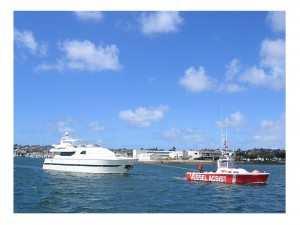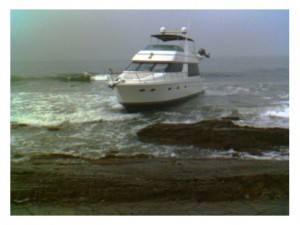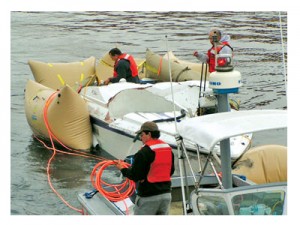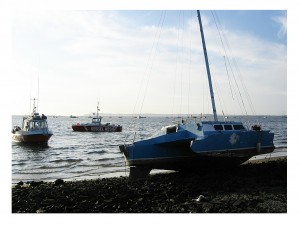Towing vs Salvage
” The thin veneer we call civilization can disappear where a shipwreck is concerned.”
Richard Loran, Shipwrecks of Great Britain and Ireland

 Since the same marine assistance company often provides both towing and salvage services, it is essential that the boat owner reach an understanding with the marine assistance provider before action is taken, cautions Jerry Cardarelli, BoatUS Vice President of Towing Services.
Since the same marine assistance company often provides both towing and salvage services, it is essential that the boat owner reach an understanding with the marine assistance provider before action is taken, cautions Jerry Cardarelli, BoatUS Vice President of Towing Services.

Boat Owners Association of The United States
Salvage Arbitration Plan
880 S. Pickett St.
Alexandria, VA 22304
Click Here to Email Salvage Arbitration
 But you will almost certainly discover a new low point when you first receive the salvor’s bill for salvage work or wreck removal. The phrase “sticker shock” comes to mind, but understates the case. The salvors expectations are created by 200 years of Admiralty Court decisions – including recent ones – where judicious minds felt that significant “rewards” were necessary to encourage people to invest their capital and risk their lives to save others in peril on the sea.
But you will almost certainly discover a new low point when you first receive the salvor’s bill for salvage work or wreck removal. The phrase “sticker shock” comes to mind, but understates the case. The salvors expectations are created by 200 years of Admiralty Court decisions – including recent ones – where judicious minds felt that significant “rewards” were necessary to encourage people to invest their capital and risk their lives to save others in peril on the sea.
2. Provides salvage coverage equal to the value of the boat.
3. Provides the salvage coverage in addition to the repair of any damage to the boat.
4. Does not apply a deductible or other adjustment to the payment.
2. Their boat insurance policy specifically includes a removal of wreck feature in their liability (protection and indemnity section) equivalent to the normal limit of liability ($300,000 recommended) which would pay the bill and the cost of litigation.
3. There is no deductible or other adjustment to the cost of removing the wreck.
| Time (portal to portal) | Rate | Cost |
| 1.5 hours to scene | $200.00 per hour | $300.00 |
| 10 minute ungrounding | 24ft @ $14.00 per ft. | $336.00 |
| 1.5 hours return time | $225.00 per hour (night) | $312.50 |
| Total | ||
| $948.50 |
Salvage Contract
To download or view and print in PDF format click here. ![]()
(permission to reprint without alteration is granted)
STANDARD FORM YACHT SALVAGE CONTRACT
It is hereby agreed this _____ day of ____________________, 20___, at ______ hours at
__________________________ by and between: _______________________________
(location) (Owner or Captain)
for the Yacht named “__________________________________,” which is described as a
(“Vessel”)
____________________________ and insured by: ______________________________
(yr – manufacturer – length) (“Underwriter”)
and _________________________________________, to salvage the yacht under these
(Salvage Company/Salvor)
terms and conditions:
1. Salvor agrees to render assistance to and endeavor to save said yacht and its property and deliver her afloat or ashore at _________________________________ marina or port as mutually agreed, or to nearest safe port if unspecified herein, as soon as practicable.
2. Salvor shall have the requisite possession and control of the subject yacht and be entitled without expense to the reasonable use of the yacht and its gear in the performance of recovery or salvage operations.
3. Said salvage and any towage services by the Salvor shall terminate upon delivery of said yacht as designated herein. Owner and Underwriter shall be responsible for any storage, towing or other port or marina charges following delivery and for risk of loss thereafter.
(a) NO CURE/NO PAY (Compensation, including special compensation, to be determined under ARTICLES 13 and 14, SALCON 89, and U.S. Admiralty Law.)
INITIALS ________/________
salvor owner
(b) NO CURE/NO PAY, AT A FIXED PRICE of $_____________________
INITIALS ________/________
salvor owner
(c) NO CURE/NO PAY at $_______________/per hour/per day/per vessel (or in accordance with SALVOR’s published rates, initialed and attached hereto).
INITIALS ________/________
salvor owner
(d) OTHER:
4. Compensation to Salvor for the services performed hereunder shall be in accordance with a billing and any supportive analysis of the salvage operation to be presented to Owner and Underwriter’s agents upon completion of salvage. Billing to be calculated on the basis specified in No. 3. No agreement on price or its reasonableness has been made at the scene unless agreed to in writing.
5. Services hereunder are rendered on a “No Cure, No Pay” basis; however, salvor shall be entitled to a reasonable allowance for prevention or minimization of environmental damage in accordance with Articles 13 & 14 of the 1989 International Convention on Salvage,as well as for clean up or wreck removal in the event the vessel is deemed a constructive total loss. Payment is due promptly upon presentation of Salvor’s bill. Interest at the rate of one and one-half (1.5%) percent per month (or the maximum legal rate allowed) shall accrue on any unpaid balance from 30 days after completion of salvage and presentation of a salvage bill, or as determined in accordance with the findings of any Arbitration Award.
6. In the event of any dispute regarding this salvage or concerning the reasonableness of any fees or charges due hereunder, all parties agree to binding local arbitration utilizing individual(s) experienced in maritime and salvage law. The Boat Owners Association of The United States Salvage Arbitration Plan, though not required, is available as a public service through Boat Owners Association of The United States wherever the parties agree to its use. In the event Owner is uninsured for payment of these services, Salvor may, at its election, agree with Owner to use any agreeable arbitration system or to proceed with all available legal remedies to recover sums believed due and owing.
7. It is understood that services performed hereunder are governed by the Admiralty and Maritime Jurisdiction of the Federal Courts and create a maritime lien against the yacht or its posted security. Salvor’s lien shall be preserved until payment. Salvor agrees in lieu of arrest or attachment to accept from the yacht’s Underwriter, a Letter of Undertaking for an amount equal to one and one-half (1.5) times the presented billing with a copy of the insurance policy and coverage information. If the yacht is uninsured or its Underwriter cannot provide a Letter of Undertaking, Salvor may demand the posting of a Surety Bond with its designated Escrow Agent in an amount equal to 1.5 times the Salvor’s bill. Salvor may satisfy collection of fees or charges hereunder by recourse to any security posted and shall be entitled to any costs incurred in collection of payments due hereunder including reasonable attorneys fees subject to the findings of any arbitration.
8. Salvor hereby warrants that it is acting on its own behalf and on behalf of any subcontractors retained by Salvor to perform services in the recovery or delivery of the yacht. Salvor shall be responsible for any such subcontractors’ compensation.
9. In the event the Salvor has already rendered salvage services to the described yacht prior to execution of this contract, the provisions of this contract shall apply to such salvage services.
SIGNED: _____________________________ ___________________________
Owner/Captain or Owner’s Agent Salvage Company
Print Name & Address: Print Name & Address:
Phone: (____) ______ Phone: (____) ______
Fax: (____) ______ Fax: (____) ______
____________________________________________________________________________________
This article was reprinted from the Boat U.S. website. Click here to visit that page.

